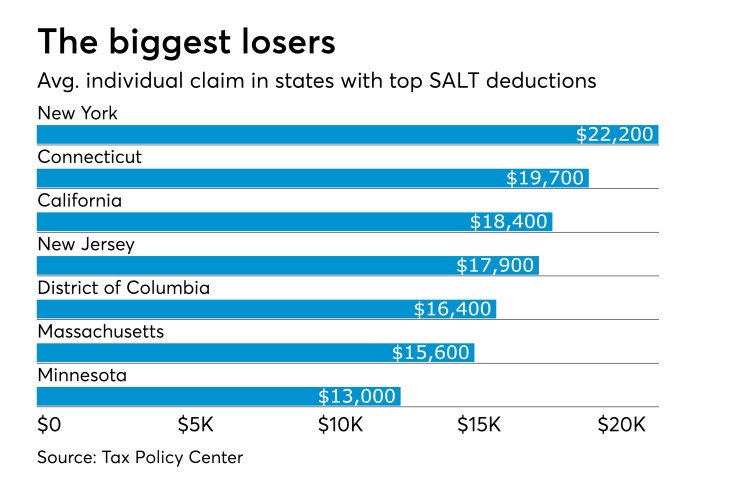High-tax states whose residents face the loss of a portion of their state and local income tax deduction due to the $10,000 cap imposed by the Tax Cuts and Jobs Act have reacted by denouncing the legislation, proposing ways to circumvent it, and now, bringing suit against the federal government.
The states of New York, Connecticut, Maryland, and New Jersey filed suit in the District Court for the Southern District of New York seeking declaratory and injunctive relief to invalidate the cap, noting that, “Congress has included a deduction for all or a significant portion of state and local taxes in every tax statute since the enactment of the first federal income tax in 1861.” The lawsuit names as defendants Stephen Mnuchin and David Kautter in their official capacities as secretary of the Treasury and acting commissioner of the Internal Revenue Service, and the United States of America.
“They’ve made some creative arguments,” said Adam Beckerink, a partner at Morgan Lewis. “They say a deduction that existed for 150 years gives rise to a right to the deduction. Also, the idea of federalism behind the Constitution – taking away the right to the deduction takes away the sovereign right of the states to make their own tax policy.”
The states’ complaint notes that the power to tax and spend is a sovereign right that predates the formation of the country, and that “the founders designed the Constitution to ensure that the federal government could not exercise its tax power to abrogate the states’ sovereign tax authority, or to use its own tax power to coerce the states into changing or abandoning their own taxation and fiscal policies.”
The complaint quotes Alexander Hamilton, who explained during the ratification debates that “the individual states would, under the proposed Constitution, retain independent and uncontrollable authority to raise revenue to any extent of which they may stand in need, by every kind of taxation, except duties on imports and exports.”
“These are creative arguments, but they’re difficult to prove,” Beckerink said. “An interesting aspect to watch is whether other states, such as California, will join in the matter. There’s also the question of the IRS looking more at the workarounds that have been passed to give residents the benefit of the deduction despite the cap.”
“While the state looks at the deduction as a right based not only on the Constitution but on past precedent, the federal government looks at it as a benefit that’s not guaranteed,” he said.

Questionable creativity
For Geoff Weinstein, an attorney at Cole Schotz, the constitutional arguments aren’t particularly strong.
“I don’t see them as having a lot of legal merit,” he said. “The only issue they have that gives them a leg to stand on is if they can show that the cap [on the state and local tax deduction] was imposed deliberately with the intent to discriminate. But the problem is that, generally speaking, tax laws always affect states disproportionally. For example, if the child credit is increased, states out West might benefit more because they have bigger families. Different states are always going to be affected differently by different tax policies.”
“Where the complaint loses traction is where it focuses on the federal government’s ability to tax states,” he said “But the cap is not taxing the states, it is simply limiting the deduction. It’s not unconstitutional for the federal government to limit the amount they want to subsidize. It’s political grandstanding, on the same wavelength as advocating the use of the charitable deduction for payment of property tax.”
“States are advocating this, but there has to be donative intent, not a quid pro quo, to qualify for the charitable deduction,” he continued. “The reason mortgage companies escrow taxes is because the local government has a super-priority over the bank, so for someone to suggest that they’re making a gift doesn’t hold up. If they don’t make the payment, they could lose their home.”





